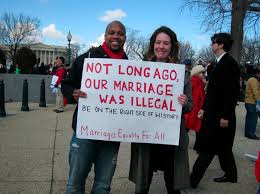Thinking about Marriage
BY John D'Emilio ON November 19, 2014
 I don’t expect the Chicago Tribune’s Business Section to get me ruminating about LGBT history and politics, but that’s what happened yesterday morning. The section’s front-page had an article, “Singles are the new sweet spot,” that described how consumer-related businesses are shaping their products and their practices to suit the needs of singles. Why might this be? Well, as the writer explained, singles may well be the largest, and fastest growing, market in the U.S. This year, for the first time, over half of U.S. adults are unmarried. And 20% of adults over 25 have never married, more than double the percentage in 1960. The unstated implication of this: marriage figures less significantly in the lives of Americans than ever before. This trend has been developing and growing for over half a century, and there’s every reason to believe this shift will continue.
I don’t expect the Chicago Tribune’s Business Section to get me ruminating about LGBT history and politics, but that’s what happened yesterday morning. The section’s front-page had an article, “Singles are the new sweet spot,” that described how consumer-related businesses are shaping their products and their practices to suit the needs of singles. Why might this be? Well, as the writer explained, singles may well be the largest, and fastest growing, market in the U.S. This year, for the first time, over half of U.S. adults are unmarried. And 20% of adults over 25 have never married, more than double the percentage in 1960. The unstated implication of this: marriage figures less significantly in the lives of Americans than ever before. This trend has been developing and growing for over half a century, and there’s every reason to believe this shift will continue.
I couldn’t help reflecting on the irony of this in relation to the campaign to legalize marriage for same-sex couples. That campaign is on a roll, accelerating faster than probably even its most active participants expected. And, there is no question that the fight for access to marriage has had a profound impact on masses of non-LGBT Americans. More than any other LGBT issue – military exclusion; hate-inspired violence; job discrimination; AIDS – the campaign for marriage allows heterosexuals to identify with us. Marriage may be declining as lived experience, but culturally, it is recognizable to all. The declarations of love that a wedding calls forth, the happiness that a wedding generates for all who are there: well, to put it simply, “queers” can’t be THAT different from “us” if they yearn to marry the one they love.
Marriage, of course, is more than just a celebration of love. It confers benefits [it also can confer misery, and lots of difficult problems, when it ends in divorce, but that’s another issue]. While one of the trends in the U.S. over the last 50 years is that the marriages that are statistically most likely to happen and to last are those positively correlated with income and education [more education and more income = more likely to get and stay married], the fact is that for individual couples the ability to marry can make a big difference in quality of life. For older couples, it means access to a spouse’s social security benefits. For many same-sex couples who are parents, it can make dealing with schools and a host of other institutions much easier.
When I think of the long history of LGBT activism in the U.S, stretching back to the post-World War II years, I’m struck by how the periods of most creativity, the periods that involved the biggest leaps forward, were those in which activists most clearly challenged common assumptions and core institutions. The U.S. LGBT movement was launched by a group of gay men who had ties to the Communist Party and who theorized that “homophiles” were a distinct minority with a special role to play in society, based on their difference. The Stonewall-era gay liberation and lesbian-feminist movement saw the oppression of queers as thoroughly linked to gender, racial, and class inequalities; it believed liberation would come only if one thoroughly re-imagined and reconstructed the nuclear family; and it sought to make common cause with other radical movements. The radicalism of ACT-UP that AIDS generated by the late 1980s wanted to remake the health-care system in the United States and provoked a community debate about sexuality and pleasure as key elements of human life. By contrast, the movement for marriage equality aligns itself with an institution that is not only in decline. It is also an institution that acts as gate-keeper for who deserves key benefits basic to a human’s survival – parenting, an income in old age, health care and insurance, and many more. Significant and exciting as this campaign has often been, it seems a sad misdirection of a social change movement’s limited resources.









Comments